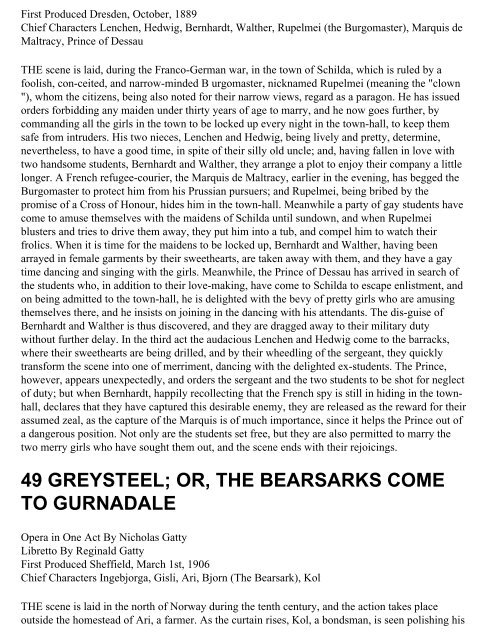Opera Plots I - MDC Faculty Home Pages
Opera Plots I - MDC Faculty Home Pages
Opera Plots I - MDC Faculty Home Pages
Create successful ePaper yourself
Turn your PDF publications into a flip-book with our unique Google optimized e-Paper software.
First Produced Dresden, October, 1889<br />
Chief Characters Lenchen, Hedwig, Bernhardt, Walther, Rupelmei (the Burgomaster), Marquis de<br />
Maltracy, Prince of Dessau<br />
THE scene is laid, during the Franco-German war, in the town of Schilda, which is ruled by a<br />
foolish, con-ceited, and narrow-minded B urgomaster, nicknamed Rupelmei (meaning the "clown<br />
"), whom the citizens, being also noted for their narrow views, regard as a paragon. He has issued<br />
orders forbidding any maiden under thirty years of age to marry, and he now goes further, by<br />
commanding all the girls in the town to be locked up every night in the town-hall, to keep them<br />
safe from intruders. His two nieces, Lenchen and Hedwig, being lively and pretty, determine,<br />
nevertheless, to have a good time, in spite of their silly old uncle; and, having fallen in love with<br />
two handsome students, Bernhardt and Walther, they arrange a plot to enjoy their company a little<br />
longer. A French refugee-courier, the Marquis de Maltracy, earlier in the evening, has begged the<br />
Burgomaster to protect him from his Prussian pursuers; and Rupelmei, being bribed by the<br />
promise of a Cross of Honour, hides him in the town-hall. Meanwhile a party of gay students have<br />
come to amuse themselves with the maidens of Schilda until sundown, and when Rupelmei<br />
blusters and tries to drive them away, they put him into a tub, and compel him to watch their<br />
frolics. When it is time for the maidens to be locked up, Bernhardt and Walther, having been<br />
arrayed in female garments by their sweethearts, are taken away with them, and they have a gay<br />
time dancing and singing with the girls. Meanwhile, the Prince of Dessau has arrived in search of<br />
the students who, in addition to their love-making, have come to Schilda to escape enlistment, and<br />
on being admitted to the town-hall, he is delighted with the bevy of pretty girls who are amusing<br />
themselves there, and he insists on joining in the dancing with his attendants. The dis-guise of<br />
Bernhardt and Walther is thus discovered, and they are dragged away to their military duty<br />
without further delay. In the third act the audacious Lenchen and Hedwig come to the barracks,<br />
where their sweethearts are being drilled, and by their wheedling of the sergeant, they quickly<br />
transform the scene into one of merriment, dancing with the delighted ex-students. The Prince,<br />
however, appears unexpectedly, and orders the sergeant and the two students to be shot for neglect<br />
of duty; but when Bernhardt, happily recollecting that the French spy is still in hiding in the townhall,<br />
declares that they have captured this desirable enemy, they are released as the reward for their<br />
assumed zeal, as the capture of the Marquis is of much importance, since it helps the Prince out of<br />
a dangerous position. Not only are the students set free, but they are also permitted to marry the<br />
two merry girls who have sought them out, and the scene ends with their rejoicings.<br />
49 GREYSTEEL; OR, THE BEARSARKS COME<br />
TO GURNADALE<br />
<strong>Opera</strong> in One Act By Nicholas Gatty<br />
Libretto By Reginald Gatty<br />
First Produced Sheffield, March 1st, 1906<br />
Chief Characters Ingebjorga, Gisli, Ari, Bjorn (The Bearsark), Kol<br />
THE scene is laid in the north of Norway during the tenth century, and the action takes place<br />
outside the homestead of Ari, a farmer. As the curtain rises, Kol, a bondsman, is seen polishing his













